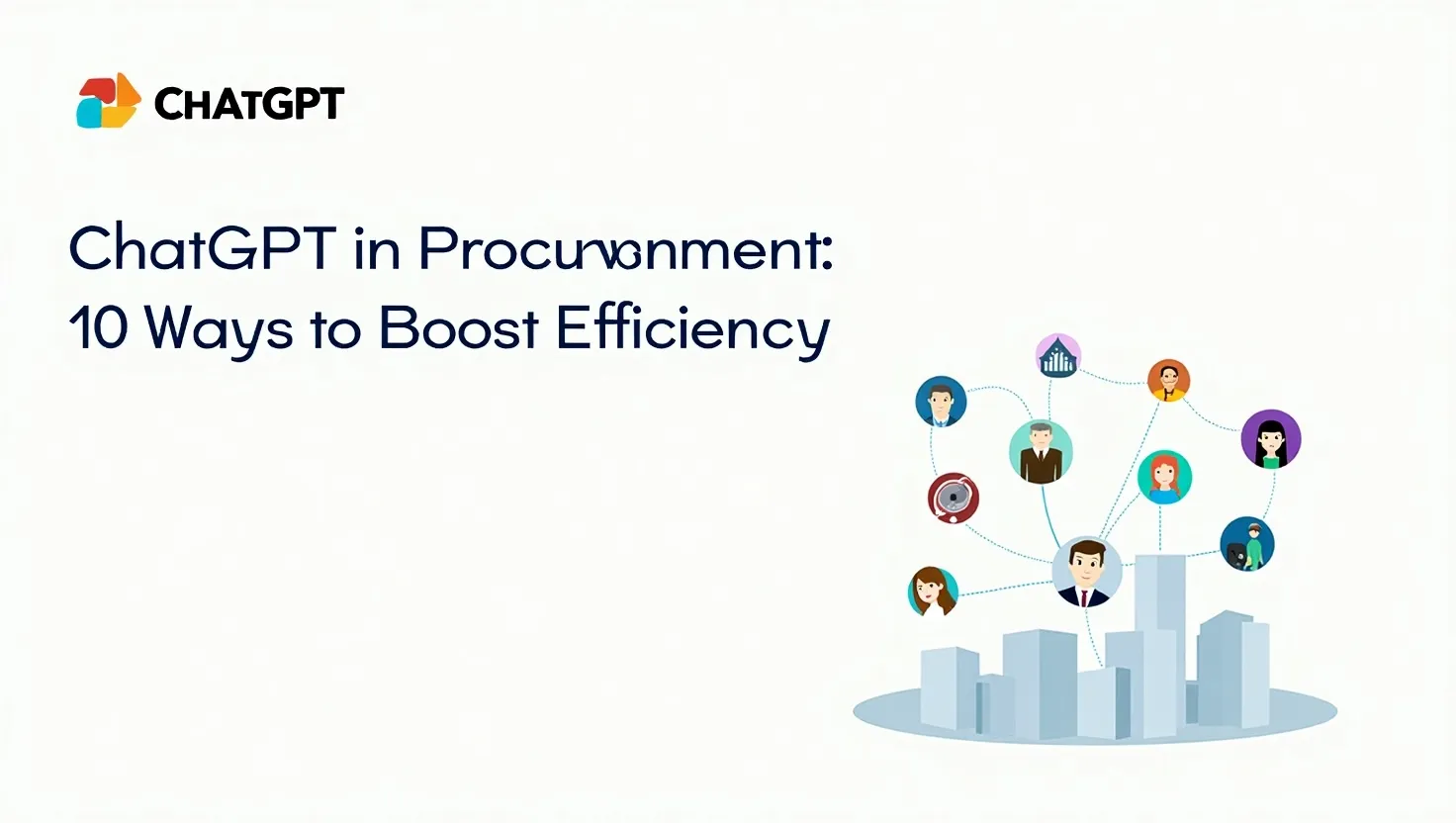ChatGPT, developed by OpenAI, is a powerful AI tool transforming how businesses handle procurement. It streamlines processes, enhances decision-making, and drives efficiency. This article explores 10 practical use cases for ChatGPT in procurement, updated for 2025 with the latest advancements like GPT-4o and the ‘Operator’ feature for autonomous tasks. Whether you’re sourcing suppliers or analyzing market trends, ChatGPT can help procurement professionals work smarter.
What is ChatGPT?
ChatGPT is a large language model that uses natural language processing (NLP) to understand and generate human-like text. It can answer questions, analyze data, and perform tasks based on user prompts. As of May 2025, OpenAI has upgraded ChatGPT with GPT-4o, replacing GPT-4, offering better instruction-following, problem-solving, and conversational flow . Additionally, the ‘Operator’ feature allows ChatGPT to execute tasks autonomously, making it ideal for procurement applications like drafting documents or analyzing supplier data.
Benefits of Using ChatGPT in Procurement
ChatGPT offers several advantages for procurement professionals:
- Time-Saving: Automates repetitive tasks, freeing up time for strategic work.
- Cost Reduction: Identifies cost-saving opportunities through supplier analysis and negotiation support.
- Improved Accuracy: Reduces human error in data analysis and contract reviews.
- Enhanced Decision-Making: Provides data-driven insights for better procurement strategies.
- Efficient Communication: Streamlines supplier and internal team interactions.
These benefits align with findings from a 2023 Deloitte survey, where 72% of 350 senior procurement leaders reported increased focus on efficiency and cost savings .
10 Use Cases of ChatGPT in Procurement
Below are 10 ways ChatGPT can enhance procurement processes, with examples and prompts to guide implementation.
1. Sourcing Suppliers
ChatGPT can analyze data to identify potential suppliers based on criteria like location, product range, or pricing. This speeds up the supplier discovery process.
2. Contract Management
ChatGPT can draft, review, and analyze contracts, highlighting key terms or potential risks. It ensures contracts align with business needs.
3. Supplier Performance Analysis
ChatGPT evaluates supplier performance by analyzing data like delivery times, quality ratings, and cost efficiency.

4. Market Research and Analysis
ChatGPT summarizes industry reports, analyzes trends, and provides competitive intelligence to inform procurement strategies.
5. Generating Quotes and Proposals
ChatGPT creates initial drafts of quotes and proposals, ensuring consistency and saving time.
6. Answering Procurement Queries
ChatGPT acts as a knowledge base, answering procurement-related questions for both new and experienced professionals.
7. Predictive Analysis for Demand Forecasting
ChatGPT analyzes historical data to forecast demand, aiding inventory management and procurement planning.
8. Communication with Suppliers
ChatGPT drafts emails and responses for routine supplier communications, improving efficiency.
9. Risk Management
ChatGPT identifies supply chain risks by analyzing data and suggests mitigation strategies.
10. Negotiation Simulation and Training
ChatGPT simulates negotiation scenarios, helping professionals practice and refine their skills.
| Use Case | Description | Example Prompt |
|---|---|---|
| Sourcing Suppliers | Identifies suppliers based on specific criteria. | “Find suppliers in Asia offering electronic components at competitive prices.” |
| Contract Management | Drafts, reviews, and analyzes contracts for risks and improvements. | “Review this contract and highlight any unfavorable clauses.” |
| Supplier Performance Analysis | Evaluates supplier metrics like delivery and quality. | “Analyze the performance of our top 5 suppliers based on delivery times.” |
| Market Research and Analysis | Summarizes trends and provides competitive intelligence. | “What are the current trends in the global supply chain management software market?” |
| Generating Quotes and Proposals | Creates consistent drafts for quotes and proposals. | “Generate a quote for 1000 units of product X with a 5% discount.” |
| Answering Procurement Queries | Acts as a knowledge base for procurement questions. | “What are the key factors to consider when evaluating a new supplier?” |
| Predictive Analysis | Forecasts demand using historical data. | “Predict the demand for product Y in the next quarter based on past sales.” |
| Communication with Suppliers | Drafts emails and responses for supplier interactions. | “Draft an email to supplier Z requesting a status update on order #12345.” |
| Risk Management | Identifies and mitigates supply chain risks. | “What are the risks of sourcing raw materials from region A?” |
| Negotiation Simulation | Simulates negotiations for skill development. | “Simulate a negotiation with a supplier for a price reduction on bulk orders.” |
Getting Started with ChatGPT for Procurement
- Access ChatGPT: Visit OpenAI’s website to use the free version or ChatGPT Plus for advanced features.
- Craft Effective Prompts: Use clear, specific prompts to get accurate responses. For example, include details like data sources or desired output format.
- Start Small: Begin with simple tasks like drafting emails or summarizing reports before moving to complex analyses.
- Verify Information: Always double-check ChatGPT’s outputs, as inaccuracies can occur, especially with sensitive data .
Best Practices and Safeguards
- Data Privacy: Avoid inputting sensitive data into public AI tools to protect confidential information.
- Accuracy Checks: Verify ChatGPT’s responses, particularly for critical decisions, as it may occasionally provide incorrect information.
- Ethical Use: Ensure AI use aligns with your organization’s ethics and compliance policies.
- Training: Educate your team on ChatGPT’s capabilities and limitations to maximize its benefits.
A 2024 Sievo report notes that 92% of Fortune 500 companies have adopted AI tools like ChatGPT, but security concerns remain critical .
Final Thoughts
Integrating ChatGPT into procurement is about more than adopting AI—it’s about reimagining workflows. By using ChatGPT strategically and ethically, procurement teams can drive innovation and deliver lasting value to their organizations.
